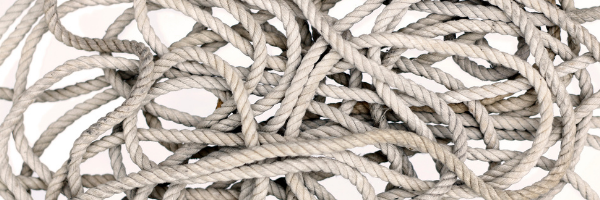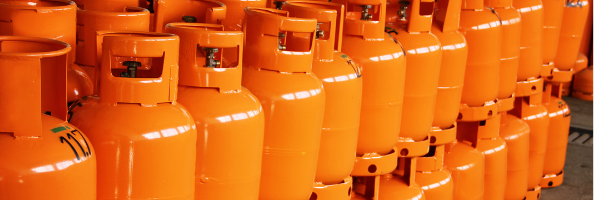Maybe you’ve heard this over the last couple of years, but what we all put in our recycling bin actually matters a lot. And now, during a pandemic, it matters even more. Since about 40% of the global supply chain depends on post-consumer materials, yesterday’s office memo and home delivery cardboard box are tomorrow’s toilet paper, box of tissues, or yet another box from the Post Office, UPS, or FedEx.
So – now more than ever – recycling as much as possible is important. But it’s also important to make sure – (say it with me) now more than ever – that all that stuff in the blue recycling bin or cart is actually recyclable. When we “wishcycle,” or hope that all that stuff can go in the bin, instead of knowing, that contamination, as it’s called, can bring down the usefulness of the real recyclables – or worse, be really dangerous to the crew that works in your friendly neighborhood recycling plant.
So… We’re here to help! As always, we have the Recyclopedia to help you know which bin to put things in, but without further ado, we present…
ECOMAINE’S TOP 10 RECYCLING CONTAMINANTS
(plus a little info about each one)
Plastic bags & films: single-use plastic shopping bags, films, and wraps (like the air pillows and bubble wraps we get in our deliveries) don’t go in your recycling bin. Yeah, there’s a recycling triangle on them, but the only way to recycle them is to take them back to a retail or grocery store and put them in the plastics bin there. You can learn more about exactly what kinds of plastics are OK there – and where your closest drop-off store is – at plasticfilmrecycling.org. Otherwise, they go into the trash.
Bagged recyclables: more on the plastic bags theme. Sometimes, it’s nice to have everything tied up with a neat bow. But not your recycling, please. When it gets here, we won’t know if the stuff in that bag is awesome, clean paper and plastic or if it’s dirty diapers or pet waste. Please keep your recycling loose and dry in the bin.
Styrofoam: This is another one that has the recycling arrows symbol on it. Do you know why? Technically, foams are often recyclable. But here’s the thing: the closest place to Maine that recycles foam is in New Jersey. And if we were able to sort foam, we’d need to put all that super-light, super-bulky material on a big 18-wheeler to go to New Jersey. The truck probably wouldn’t weigh all that much more than it does empty! That’s not economically sensible, and all those emissions sure aren’t environmentally friendly, either. So, we try and reduce foam use in the first place, and then it goes in the trash, where ecomaine’s Waste-to-Energy plant can generate electricity from it!
Tanglers: There’s a lot of items in this category. We call the “tanglers” because they’re the long, flexible materials that can get caught in our sorting gears. Think of things like chains… Extension cords… String lights… Ropes… Large plastic film (shower curtains and pallet wraps are good examples) … Cables… Straps and bungee cords… Things like that can really shut down a facility like ecomaine’s.

Textiles: Clothing and fabric can also act as “tanglers,” too. And pillows or cushions have a lot of foam in them, so they act like big, light cardboard at times. Plus… They’re just not recyclable. Here’s a good tip: Goodwill of Northern New England will take clothing donations, even if they’re not good enough for resale – they’ll make rags or insulation out them, if they can’t donate them further!
Straws & lids: Many places are going to paper straws, and lots of people now carry reusable straws – that’s great! But straws and lids (even if they’re paper, but especially if they’re plastic) aren’t recyclable. There are three rules for recycling plastic at most recycling facilities:
- It must be a container (think a bottle, cup, or jug)
- It must be made of hard or rigid plastic (not a bag or film, like we talked about before)
- It must have a #1-7 recycling symbol on it
If something fails any of these three requirements, it’s not recyclable in your bin.
Paper towels, napkins, etc.: Made of paper. Good, right? Well, yes, but not recyclable. The fibers in paper towels or tissues are too short to be recycled yet again (though they’re often made from recycled content!) Good news, though – they can often be composted!
Large, sharp, & dangerous metal: Metal is great – it’s almost infinitely recyclable. But there’s a difference between single-sort recyclable metal and metal that needs to go into a dedicated scrap metal bin at a transfer station. We do want things that are containers or foil: cans, bottles, pots and pans, clean aluminum foil, and even empty aerosol spray cans. But things like car parts, nails and screws, knives and swords (yes, you heard me…swords), and especially propane tanks (which can explode in our plant!) are big NO THANK YOU’s.
And let’s talk about sharps for a second. Please don’t put needles of any kind in the recycling bin, either loose or in a container. Super dangerous! There are some good ways to dispose of them, but the recycling stream is definitely not one of them.

Food waste: It’s a really great idea to keep food waste out of the trash stream. BUT the best way to do that is through composting or anaerobic digestion, PLEASE not in the recycling! Oils and moisture from one small piece of food can ruin a whole ton of paper or cardboard. So please look to the compost bin instead of the one for recycling!
Garbage: Then, there’s just straight-up garbage. This is kind of a catch-all and includes things like chip bags and wrappers that can’t be recycled, everyday items like those plastic tags on new clothing or many personal care products’ packaging. And, sadly, it also includes things like diapers. Just… Please don’t put diapers in the recycling bin. Please. No.
That’s a lot of info, but we appreciate you looking it over, and learning more about recycling right! If you need more information, we’re just a click or call away (207-773-1738) – we’d be happy to talk more, or even give some tailored education to you, your family, or your community group, via one of our full-time Environmental Educators! Thanks!


